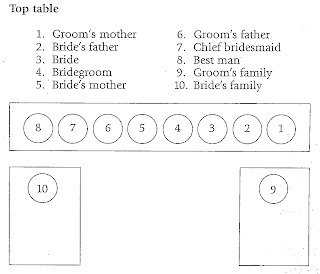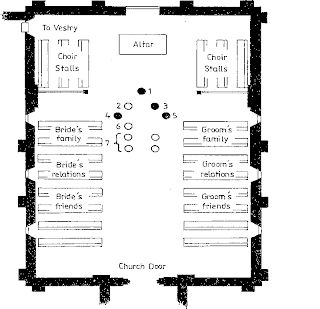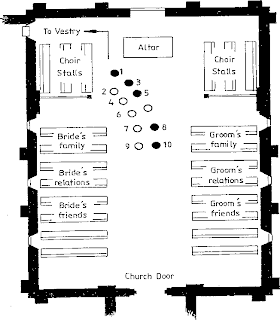As with all marriages outside the Church of England, the couple must give notice of their intention to marry to the local Superintendent Registrar (or registrars if they live in different districts). Often the priest or one of his parishioners will be authorized to register the marriage, in which case the registrar is not required to be present at the wedding.
The marriage ceremony may be conducted during Mass (called a Nuptial Mass) or outside Mass, usually when one of the couple is not a Roman Catholic. However, the rite of marriage is the same in either case.
The priest first addresses the bride and bridegroom on the significance of marriage within the Church: it is regarded as a sacrament which will 'enrich and strengthen' them so that the union will be one of 'mutual and lasting fidelity'.
The couple have to declare no lawful impediment to marriage; they promise to be faithful to each other and to accept that they bring up children within the Roman Catholic faith. The priest invites them to declare their consent to marry 'according to the rite of our Holy Mother the Church', to which each replies 'I will'.
Right hands joined, the couple then call upon the congregation to witness the marriage, and make their vows: 'to have and to hold from this day forward ... till death do us part'.
The priest confirms them in marriage and the rings are blessed and exchanged - or only one may be given - using the following words:
'I (Christian name only) take this ring as a sign of my love and fidelity. In the name of the Father and of the Son and of the Holy Spirit.'
JEWISH WEDDINGS
When Jewish people marry, they are required to give notice to the registrar, but the marriage may be solemnized in a synagogue or private house. When a synagogue or house is used, the secretary of the synagogue to which the man belongs must take down the necessary particulars.
The ceremony, when held in a synagogue, varies in the form it takes. The bride and bridegroom stand under a canopy - a chuppah - which is a reminder of the time when the Israelites were forced to live in tents. The couple's parents join in the ceremony by standing under the canopy with them and supporting them. Behind are their relations and friends. The best man stands behind and to the left of the bridegroom.
The rabbi delivers a short address to the couple. Then the bridegroom turns to the bride, who stands to his right, and before placing the ring on her finger, says, 'Behold, thou art consecrated unto me by this ring, according to the law of Moses and of Israel.' The bride should wear no other rings or jewellery, not even her engagement ring.
The next step is the reading and signing of the Hebrew marriage contract. The man promises to be a true and faithful husband, and to protect, support, love, honor and cherish his bride. She promises to be true and faithful and to love, honor and cherish him.
Following the vows, the Seven Benedictions are recited and the couple drink wine, twice from the same vessel; then the bridegroom dashes the glass to the ground. Drinking the wine reminds the couple that they are required to share each other's pleasures and halve each other's troubles. The broken glass symbolizes the weakness of marriage without love.
Before the ceremony is concluded, the following covenant is signed:
'On the ... day of the week, the ... day of the month of... in the year ... corresponding to the ... of... the holy covenant of marriage was entered into, in between the bridegroom, and his bride, ...
'The said bridegroom made the following declaration to his bride: "Be thou my wife according to the Law of Moses and of Israel. I faithfully promise that I will be a true husband unto thee. I will honor and cherish thee; I will work for thee; I will protect and support thee; and will provide all that is necessary for thy due sustenance, even as it beseemeth a Jewish husband to do. I also take upon myself all such further obligations for thy maintenance during thy lifetime as are prescribed by our religious statutes".
'And the said bride plighted her troth unto him, in affection and with sincerity,, and has thus taken upon herself the fulfillment of all the duties incumbent upon a Jewish wife.
'This covenant of marriage was duly executed and witnessed this day according to the usage of Israel'.
QUAKER WEDDINGS
When a Society of Friends wedding is to take place, the arrangements come under the care of the Society's registering officer for the area concerned.
It should be noted that besides giving notice to the registering officer, notice must also be given to the local Superintendent Registrar in the usual way.
The Society's registering officer will ensure that the Quaker regulations are followed and that, if they are satisfactorily completed, the meeting for worship to solemnise the marriage is duly approved.
At the ceremony, the usual custom is for the bride and bridegroom to sit surrounded by their relations and friends, and then for the two to stand at a moment when they feel it is right. Holding hands, the man makes the following declaration:
'Friends, I take this my friend, to be my wife, promising through divine assistance, to be unto her a loving and faithful husband so long as we both on earth shall live.'
The bride makes a similar declaration. A certificate is then signed by the couple and two witnesses, stating that the couple made the necessary declarations, that they fulfilled the legal obligations and were duly married. All those present are invited to sign the certificate after the meeting is over. No ring need appear at the ceremony, but sometimes one ring is given or rings may be exchanged after the declaration.
WEDDINGS ABROAD
A fairly recent innovation is to travel abroad to get wed. There are travel companies who will arrange the whole package deal for you. The favorite destinations are some of the islands of the West Indies, the Seychelles, Mauritius and Mexico. It could be seen as traveling to your honeymoon destination first, then getting married.
Some couples may take members of their family or friends with them, but if they arrive alone the travel companies may organize a best man and bridesmaids, in addition to all the legal arrangements, hotel and travel, and 'extras' such as flowers, wedding cake, reception and video of the ceremony.
If the idea of marrying abroad appeals to you, but you would prefer to make the arrangements yourself, you should be especially careful. The problems you might encounter are numerous and will involve you in a great deal of correspondence with the various authorities.
THE RECEPTION
After the wedding ceremony comes the reception and in the case of the traditional English wedding this follows a certain pattern. It may be a very large reception with hundreds of guests or a small, informal gathering, but in either case there is a very similar pattern to the proceedings.
The first decision regarding the reception, which needs to.be made some months in advance of the wedding, is where the reception should be held: hall, hotel or house. With a large number^of guests, the choice is between hall and hotel, and m either case an. early booking will be necessary. An average size house can prob-r ably accommodate only 30 or 40 guests, but there is an attractive alternative if the house has a large garden. It is possible to hare marquees which can be set up a few days beforehand and which contain all the necessary fittings such as lights and wooden or mat flooring.
A decision about the catering arrangements will probably be made at the same time as the choice of venue is decided Naturally a reception held in a hotel will mean that the hotel will arrange everything at an inclusive charge per guest. It will also provide rooms in which the bride and groom will be able to change their clothes during the reception.
Unless some members of the family are particularly adept at catering, it is probably wise to call in specialist caterers, whether the reception is in a hall or a private house. It might seem feasible to lay on a tasty spread for 30 or so guests in a small, informal gathering at home, but with a hundred and one other things to think of on the big day, the professional touch can often-be- worth the extra cost. A booking in a local hall no doubt provides the most options: outside caterers or do-it-yourself, sit-down meal or buffet. What the hall might not have is a suitable room in which the bride and groom can change into their going-away outfits, so a suitable arrangement will need to be made.
A Formal Reception
A formal or semi-formal reception will have a receiving line to welcome the guests. This usually consists of the bride's mother and father, the bridegroom's mother and father and the bride and bridegroom themselves - in that order. This applies whether or not either set of parents is divorced. New partners are not normally included in the receiving line. The best man is not always included as he is usually the last to leave church, but if he does arrive in time he should be included after the groom.
Each guest is greeted by name or by politely asking their name. The bride and groom introduce each other to the guests when necessary or convenient. Generally it is sufficient for each guest to identify themselves to the first in the line. This is the traditional way, but today receiving lines tend to be more spontaneous and faster moving. If a large number of guests has been invited and you want to speed up proceedings, the bride and bridegroom can do the receiving on their own.
On entering, the guests are usually presented with a glass of wine or an aperitif, and when the last guest has been received everyone looks at the seating plan to find out where they are placed. The toastmaster (or best man) guides the guests to their seats. The processional order is: bride and groom, bride's father with groom's mother, bride's mother with groom's father, chief bridesmaid (with best man if he is available), bridesmaids, page boys, ushers, then guests. Sometimes seating arrangements are left to the guests to make their own choices. If there are separate bar and dining areas, early arrivals can wait comfortably in the bar until everyone is assembled.
Seating arrangements vary according to the number of guests and the layout of the tables. For a formal reception, however, there will be a 'top table' for the principal members of the wedding party and the attendants (see Checklist 6.1). Since it is an honor to sit at the top table, be careful not to hurt anyone's feelings by including a guest who is not also a member of the wedding party. An aunt who has flown in from Australia for the wedding may, however, be classed as an exception!
The bride and the two mothers usually work out how best to seat the other guests. If there are complications due to a parental divorce, seating arrangements at the top table should be discussed with all the parties concerned. Depending on how co-operative they are likely to be, there should be no problem in finding everyone a place. You will probably want to aim at some interchanging between the families, but not so much that no one knows what to say to each other.
If traditional arrangements seem inappropriate the solution may be to have a room full of separate tables: this can create a much more relaxed and successful atmosphere as long as the guests are grouped tactfully with a good mix of men and women.
If the bride's parents are divorced and she has been brought up by her mother and a stepfather, he may be asked to make the first speech and propose the main toast. However, the exact arrangements will vary according to the individual circumstances and should be discussed and agreed beforehand.
The most important thing is that personal feelings about ex-partners do not get out of hand and interfere with the success of the wedding. If the situation is handled with dignity and understanding, there is no reason why they should.
If a minister is present they must be invited to say grace and should have been approached in advance. If there is no minister present, grace may be said by the bride's father, for which the best man or toastmaster requests silence. The bride and. groom are the first to be served or to serve themselves.
After the last course is over (or alternatively, about halfway through proceedings), the cake-cutting ceremony and the toasts and speeches take place.
If there is no official toastmaster present, the best man introduces the speakers.
The first to speak is the bride's father who stands and says a few words before proposing the main toast: 'Health and happiness to the bride and bridegroom.' The bridegroom responds briefly, thanking the bride's parents and the guests, and ends by proposing a toast to the health of the bridesmaids. The best man follows by replying for the bridesmaids and reading out the congratulatory telemessages and cards. The bride may also elect to say a few words.
All the speeches should be kept short and informal. If they can be witty without being offensive, so much the better. However, a sincere approach often goes down just as well, so if you have any doubts about your abilities as a humorist, it is best to avoid jokes!
The cake should have been ordered some weeks before and delivered to the reception on the day of the wedding. Icing on a traditional wedding cake can be very thick so it will help if this is already cut through. The bride holds the knife in her right hand, with the bridegroom's right hand on hers, and her left hand on top. After the first slice has been successfully dealt with, the cake can be taken away and cut into smaller pieces for the guests to eat with their coffee. You may wish to rescue the top tier to keep for a christening. Use cake boxes to send pieces of the cake to people who could not attend the wedding.
If there is to be dancing, the bride and bridegroom will be first on to the floor, followed by the chief bridesmaid and the best man, then the parents of the bride and groom and members of the two families.
After a while spent chatting to the guests, the couple slip away to change into their going-away clothes, returning for a few minutes to say their final goodbyes before going on honeymoon. Traditionally, just before they leave, the bride tosses her bouquet to a bridesmaid or a young female guest who, tradition has it, will be the next in line for marriage.
At the end of the reception the best man collects the groom's clothes and checks that nothing has been left behind by male guests. He ensures that the wedding cards and any messages are returned to the bride's mother. The host, hostess and best man are the last to leave.
CHECKLIST: SEATING PLACES AT THE RECEPTION

Variations on the seating may be made, although the top table is usually reserved for the wedding party.. Alternating the sexes is usual. The families can be mixed
CHECKLIST: AT THE RECEPTION
As the guests arrive they should be greeted by:
The bride's mother and father
The groom's mother and father
The bride and groom
Attendants and ushers should offer drinks and chat pleasantly
The best man guides guests to the seating plan
The hostess (the bride's mother) should give the signal for the wedding breakfast to begin
If champagne is used for toasts only, it should be left until after the meal and served just before the speeches begin
The best man or toastmaster requests silence for grace
The minister or the bride's father says grace
After the meal, the best man or the toastmaster calls upon the bride's father to speak
The bride's father gives a speech and proposes the toast to 'The bride and groom'
The bridegroom responds, gives a speech and proposes a toast to 'The bridesmaids'
THE RECEPTION
The best man responds on behalf of the bridesmaids, gives a speech, reads out a selection of telemessages and cards and gives the programme for the rest of the reception
The bride and groom cut the cake
The bride and groom lead the dancing, followed by the chief bridesmaid and the best man, and the parents of the bride and groom
The best man oversees the decoration of
the going-away car, ensuring that no damage is done
The best man organises transport for the bride and groom and hands over the documents
The bride and groom change into their going-away outfits
The best man places the luggage in the going-away car
The bride and groom say their goodbyes
The bride tosses her bouquet


